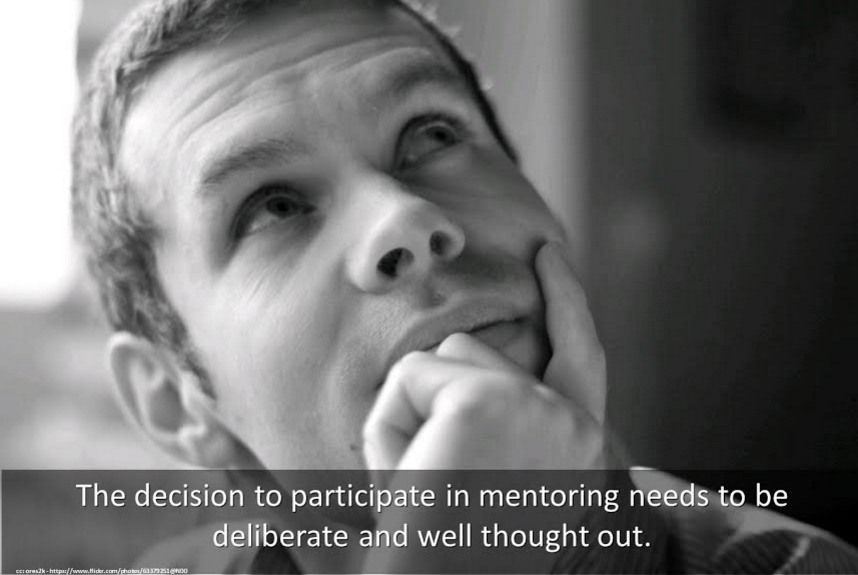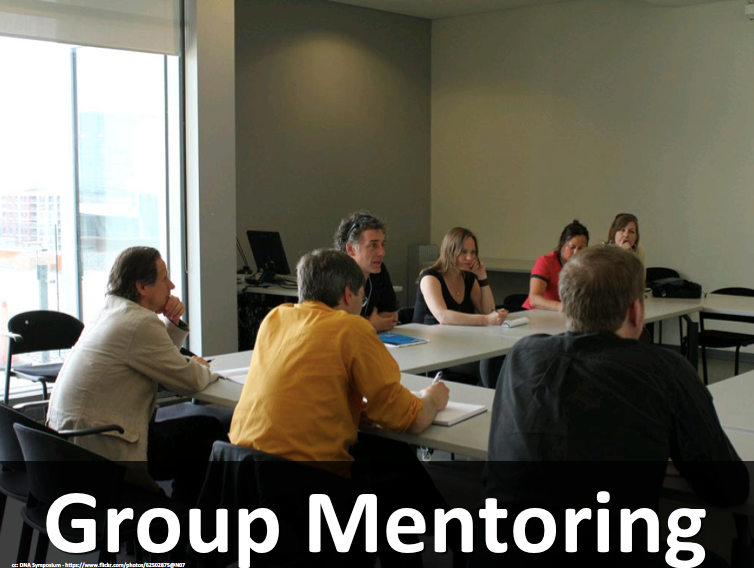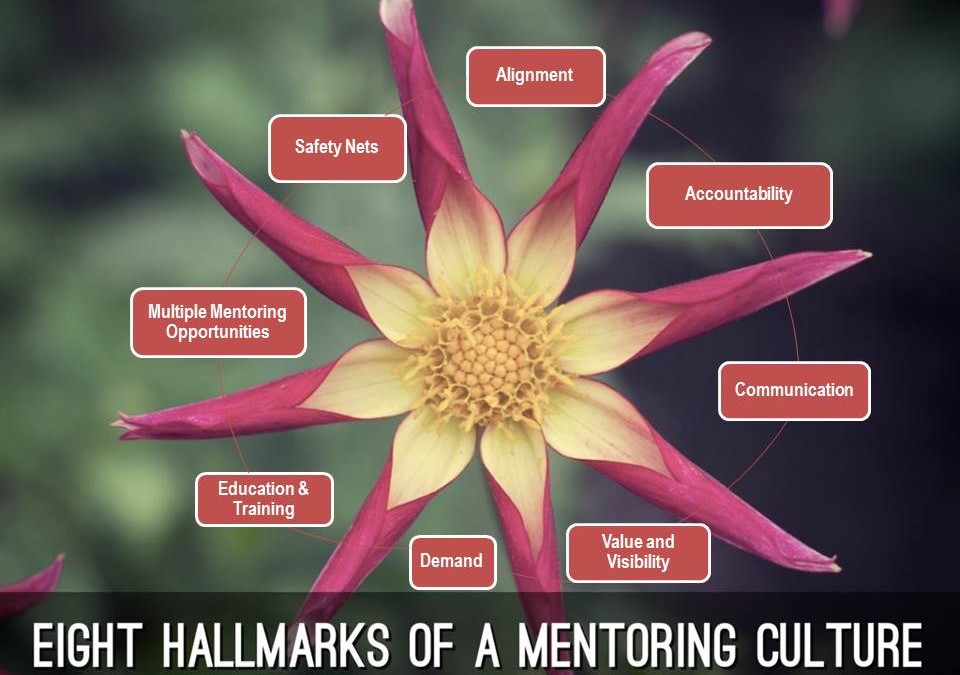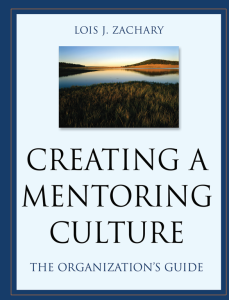
by Center for Mentoring Excellence | Jun 20, 2016 | Facilitating Learning, Making Mentoring Work For You
Your company has just announced a new mentoring initiative that has generated a groundswell of interest and excitement. Your supervisor has signed you up as a mentor and just let you know. Gulp! What am I in for?
You are busier than ever on top priority and high impact projects and you know there are three more waiting for you once those are completed. Additional responsibilities in your role are stressing you out.
Now you have been “voluntold” that you must participate in the initiative as a mentor.  Can you say no? How would it look if you didn’t participate? What would your supervisor think? What would it say about your ability to manage your workload?
Can you say no? How would it look if you didn’t participate? What would your supervisor think? What would it say about your ability to manage your workload?
Mentoring participation is a serious commitment. Participating because you’ve been voluntold isn’t a good enough reason to say yes. You have to want to be a mentor. It takes time and effort, and without a serious personal commitment you may well not have the energy and enthusiasm you will need to be successful.
Know that you are not alone. Peer pressure can be bad enough without being voluntold by one’s supervisor.
Here are six questions to consider before making this hard decision:
1. Do I have a sincere desire to engage in a mentoring relationship?
2. Am I willing to do the work required to prepare for mentoring meetings?
3. Do I possess the requisite knowledge, expertise or experience to mentor a mentee?
4. Do I have sufficient time right now to mentor a mentee?
5. Do I feel comfortable being a mentor?
6. What competencies or skills do I possess that would make me a good mentor?
If you can’t do the job that being a good mentor requires, It is best to speak up and say no (even if you have been voluntold).

by Center for Mentoring Excellence | May 27, 2016 | Facilitating Learning, Group Mentoring
When we think of mentoring relationships, we usually think of one-on-one interactions with a mentor and a mentee. But that doesn’t always have to be the case. In fact, for many organizations, group mentoring has become an equally effective (and often more efficient) way to offer mentoring services to employees. But what is group mentoring and how does it work? Here are three ways to approach group mentoring.
Team mentoring
This one is pretty self-explanatory. A group of mentors, each with their own unique set of skills and mentoring expertise, work with mentees to give them a well-rounded and multi-faceted mentoring environment.
Note: Make sure team mentors are given the necessary tools and training to make their relationships successful.
Peer mentoring
Again, the name says it all. There’s a lot that can be learned from our fellow mentees; allowing mentees to, in turn, mentor their peers is a powerful way to reinforce mentoring practices and instill leadership qualities beyond traditional mentoring settings.
Note: Goal-setting and self-direction are key. It also helps if peer mentors have similar roles, experiences and interests.
Facilitated group mentoring
What if your mentoring journey was influenced by those seeking mentoring services just like you? Chances are, you’d be exposed to new and exciting ways of thinking. That’s the idea behind facilitated group mentoring. While you still work with a traditional mentor figure, your fellow mentees will help set agendas, group goals and influence your experience in ways you wouldn’t have otherwise been able to predict.
Note: Make sure every member of the group has a specific role and responsibility; this ensures people don’t feel left out or unheard. It also helps to limit mentoring groups to eight people or less.
So, what do you think? Is group mentoring for you? Have you tried it in the past? Let us know.

by Center for Mentoring Excellence | May 18, 2016 | Mentoring Training
Mentoring at “Ideal Organization” (IO) grew out of a formal program for high potentials. The initial program created such a buzz throughout IO that now, ten years later, its participants are still committed to mentoring others and initiating mentoring opportunities in their own organizations. Several years ago an organizational survey revealed that in addition to one-on-one informal mentoring and formal mentoring programs, multiple groups actively engaged in mentoring (i.e., women’s executive mentoring, technical mentoring, and cross-functional mentoring). Leaders regard mentoring as part of their responsibility to informally mentor employees who show promise. Those charged with managing, supporting and coordinating mentoring efforts at IO monitor progress, measure results and work with teams throughout the organization to integrate mentoring process improvements. In addition, they keep an internal focus on mentoring. They coordinate mentoring efforts to make sure that all mentoring programs align with one another other and with the organization’s culture.
Mentoring at IO is always in motion and constantly creating learning bridges that empower individuals to transform Ideal so that it continues to live up to its name. The leaders at IO worked through a number of steps and phases in developing its mentoring culture. It’s still a work in progress.
Sounds great, yes?
Is your organization committed to making an ongoing investment in mentoring? If you’re serious about mentoring and are committed for the long haul, read on.
A mentoring culture creates a continuum of expectation about mentoring and establishes a standard of excellence for mentoring practice. It also encourages mentoring excellence by continuously creating readiness for mentoring within the organization, facilitating multiple mentoring opportunities, and building in support mechanisms and safety nets to ensure individual and organizational mentoring success.
 What’s more, it:
What’s more, it:
- Establishes ownership for mentoring within the organization
- Promotes shared responsibility
- Maximizes resources
- Maintains integrity
- Facilitates knowledge utilization
- Supports integration of key processes into the organization
- Creates openness to learning through mentoring
- Shortens ramp up time
What are you waiting for? To learn more, purchase your copy of Creating a Mentoring Culture today. It will guide you through each of the eight hallmarks that contribute to creating a vibrant and full mentoring culture.

by Center for Mentoring Excellence | Apr 14, 2016 | Growth and Development, Making Mentoring Work For You, Mentoring Communication, Mentoring Questions, Mentoring Relationships
Chemistry. Compatibility. While these traits are crucial to a successful mentoring relationship, there’s so much more involved, most importantly — you. What do you want to learn? Who do you want to learn it from? Recruiting a mentor can seem like a daunting task, but being thorough and prepared when making the ask leads to success.
How to Prepare
Have a conversation with yourself:
- Identify what it is you need to learn.
- Think about what you need from a mentor.
- Consider how much time you can contribute to a mentoring relationship. Look yourself in the mirror and honestly consider if you have the time, willingness and commitment to mentoring.
- Think about your prior mentoring experiences and how you can actively contribute to the success of your relationship.
Ask yourself some important questions:
- Am I sincerely interested in learning?
- Am I willing to commit time to developing and maintaining a mentoring relationship?
- Am I willing to be open and honest with myself and another person?
- Can I participate without aversely affecting my other responsibilities?
Making the Ask
You can do all the preparation in the world, but if you aren’t able to communicate your needs and ask a potential mentor for their time and energy in an inviting and honest way, you may lose out on a great mentoring opportunity.
Make sure to clearly communicate:
- What you want to learn.
- Why you want to learn it.
- Why you think this person is a good match for you.
- What you need from the relationship.
- What you are willing to contribute.
Make sure to present yourself as:
- Competent
- Committed
- Compatible
- Conscientious
- Ready to Learn
- Accountable
With the right preparation, the right communication and the right presentation, you’ll be able to set yourself up for success when asking a potential mentor for their help.
How have you sought out mentors? What worked and didn’t work for you?

by Center for Mentoring Excellence | Mar 21, 2016 | Goal Setting Conversation, Growth and Development, Mentoring Relationships, Supporting Mentors and Mentees
The Importance of the First 90 Days
It’s a fact: The first 90 days sets the tone for your mentoring relationships! According to Lory Fischler, co-author of Starting Strong (Jossey-Bass 2014), “Many mentoring relationships don’t actually survive the three-month milestone. That’s because they start with good intention and energy but get derailed by lack of time, structure, purpose, progress and accountability.”
We’ve identified six essential conversations that we believe ought to take place during the first 90 days of a mentoring relationship to ensure that it starts strong and stays focused. These conversations set the tone for mentoring success.
Conversation #1: Mentoring partners often jump into mentoring too soon and fail to take the necessary time to get to know one another. When mentoring partners spend time to build their relationship by engaging in real conversation, they are better able to establish the high level of trust that is critical for learning and growth.
Conversation #2: Once trust has been established, it is time to decide how to structure your mentoring relationship and your meetings so that you stay on track. By proactively talking about ground rules, confidentiality, hot buttons and boundaries, mentoring partners avoid problems along the way.
Conversation #3: A robust series of conversations about the mentee’s goals is often more important than the process of formally defining them. Through conversation an effective mentor facilitates mentee understanding about his or her needs and the areas of potential growth necessary to meet those goals.
Conversation #4: Once goals have been identified, it’s time to talk about how to achieve them. This is accomplished by identifying learning opportunities to support and challenge the mentee — to encourage a mentee to stretch and stand outside his or her comfort zone. This where true growth and development occur.
Conversation #5: Along the way, there may be stumbling blocks that get in the way of the relationship. Holding a conversation to address them as soon as they occur keeps the focus on progress and forward movement.
Conversation #6: The three-month milestone is ideal for holding a two-way feedback check-in conversation. By addressing meaty questions (i.e., “What has been the biggest learning to date? What are we doing that is providing value? What is working and what could be better?”) both mentor and mentee receive feedback that enables them to elevate their individual skills.
You won’t want to miss our day-long conference, Making Mentoring Matter: Strategies and Tools for Individual Development and Organizational Effectiveness on Wednesday. May 4, 2016 in Bellevue, WA., where Lory Fischler will be presenting a workshop entitled “Starting Strong: The First 90 Days.”

 Can you say no? How would it look if you didn’t participate? What would your supervisor think? What would it say about your ability to manage your workload?
Can you say no? How would it look if you didn’t participate? What would your supervisor think? What would it say about your ability to manage your workload?


 What’s more, it:
What’s more, it:


